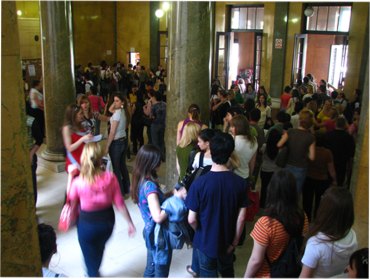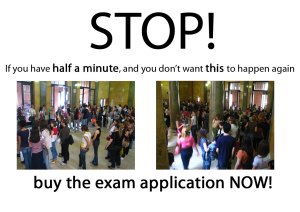All you have to do is take away one quite important minute out of each day.
You could be dead next Friday
From coals to diamonds – the evolution of ideas
One of the most valuable lessons from my experimental language workshop was seeing how ideas can change, evolve and die when in contact with reality. What I imagined the workshop would look like and what it turned out to be are two things that not only look different, but are also based on very different principles.
I’m posting an email I’ve recently sent to a friend of mine which sprang out of one of our discussions about language learning, trying out new ideas etc. In it you will see the key stages of the evolution of my workshop and some of my personal reflections on the whole topic. Name and other personal details have been removed.
Thinking properly, part 2 – looking Lady Destiny in the eyes
I enter the small flat. They are sitting at the kitchen table. Greetings are exchanged, and we begin the process.
I translate their words to Jenny, the social worker. Her very calm, soothing demeanor makes it difficult for me, and even them, to be nervous. I convey their story – the sad history, the current situation, the outcome they desire.
They answer her questions. She asks them more. They speak about everything, calmly and truthfully. They do what they must – slowly, they lay their lives in front of us on the table, bare and defenseless.
I look into their eyes, and they look at mine. For a moment, I become a part of their world, of them. I may be translating their words coldly and objectively, but I cannot help feeling incredibly moved by the whole situation. Their lives, and the lives and destinies of two more persons they care about immensely, will be determined by this conversation, by this appraisal of whether or not they are… adequate.
We finish. I say goodbye to the family. It is a truly strange feeling; stepping into someone’s life, watching them talk about their most private, most important thing in their world, and then disappearing, probably never to see them again.
I take Jenny to the tea-place where just hours ago I had a very special situation of my own. We talk about the adoption case, Serbia and life in general. I receive my payment and we say our goodbyes.
I cannot talk about the adoption case in detail, because I am forbidden by law, but it is not necessary. What is important here is to realize that, yes, there are special moments; moments which have enormous impact on how your life will go from there on.
But they are not always so clear and powerful. In fact, they are a lot more common than you think. But too often we say no to them.
It could be from fear, or social conditioning, or indifference, or any combination of those. In any case, the result is that you say no to them; and because of that you don’t organize that road-trip, you don’t meet that amazing new person and you don’t learn that language you always wanted to. You miss a chance not to grow, but to flourish. Because you thought that it wasn’t anything important.
I passed by Dina on the street, and our eyes met. We, stopped, talked and realized we don’t know each other, but exchanged phone numbers anyway.
Two months later, I promised to her I’ll visit her in Paris next summer.
Next summer, I visited her in Paris. I slept in 5 different places, from a student’s flat so small you literally cannot lie down on the floor (don’t ask about the bathroom. Just don’t.), 10 minutes by foot from Notre Damme, to a spacious apartment in a luxurious suburb. I met Laura, Penelope, David, Vladi, Brankica and others. I had breakfast with Milica on Montmartre. I walked, relaxed, read books, planned my experimental workshop and also learned a lot about myself. Being alone most of the day in a beautiful city had that effect, among many others.
My trip to Paris was a fantastic experience, and I have no idea how much further it will positively influence my life.
But it wouldn’t have happened if Dina and I didn’t look each other in the eyes. And decided to stop. You know, just to check if we know each other.
So, say yes to those moments. Learn to recognize them and capture them before they pass you by. Listen to that voice. It takes practice, and, as with everything in life, you will make mistakes. Some of those moments will lead absolutely nowhere. But some will make you go to places or do things or meet people you never dreamed you would.
Like when our eyes met. And next summer, I was in Paris.
to be continued
an experiment in simple solutions
Before every exam period since I’ve been a student of the Philological Faculty, I would see the same scene: A very long queue for buying the exam application paper. Here’s what it looks like
From what older students tell me, it’s been like this for years. And what’s causing it? The fact that you can only purchase the application paper at that one spot. It’s relatively cheap (less than half a euro per application), but you still have to pay for it, because the faculty wants as much money as possible. This process of giving money and the clerk printing the fiscal receipt and giving you the application takes some 15-20 seconds or so per person, but because of the number of people who need the application, it means you end up waiting over an hour in order to buy a piece of paper.
The problem doesn’t really affect the professors and the working of the faculty, if we take out the fact that every 3 months people will be frustrated by having to stand in long queues. Oh, it also degrades our image as an institution, but that’s nothing new to us. In any case, none of the professors is interested in solving this situation, since it doesn’t really affect them in any way (apart from having to walk through the crowd when they enter the faculty building, because that’s where the place for buying the applications is).
But, here’s something which makes the whole situation even more bizzare. You can buy that piece of paper all year long! That’s right, during most of the year when there are no queues whatsoever, you can go and buy that very same piece of paper! This means that for every person that buys the application form before the exam period means that there will be one less person in the queue during the exam period; or maybe there won’t be, gasp, any queue at all!
Everyone knows that you can buy these forms throughout the year. So why don’t they?
They forget.
So, let me try to sum up: every 3 months, every year, without fail, you have the same problem. Possibly the simplest solution, excluding trying to fix it through systematic changes (as this would be met by huge resistance of the very numerous and influential change-is-risky crowd), is glaringly obvious – get the people to buy the forms before the exam period. As I said, this is at most a 20 second procedure, so in the small every day queue of at most half a dozen people, you’d get the forms in 2-3 minutes.
How can you get the people to buy the forms before the exam period? Well, let’s say you could suggest to them that they buy the forms before the exam period (yes, I’m repeating myself on purpose. I’m still dumbfounded by this whole thing). For instance, with this:
This is the English translation of the draft version of a poster which I did in less than 3 minutes in Photoshop. I took the pictures during one of the exam periods, because the idea was in my head for some time now. I’ll do a nicer version of the poster, but honestly, I’m thinking that this is enough.
The management unanimosly approved and praised my idea – an idea for which all that was needed was 3 minutes of Photoshop, a couple of Euros for printing and a few minutes of putting the posters up at several key places in the faculty.
Why hasn’t anyone thought of such a simple solution? Out of the tens of thousands of students who have over the years sat in the faculty cafes and complained about the queues, out of all the people in the administration whose job it is to make this faculty work, out of the numerous student activists who had set out to improve this faculty and who went through the same problems, why hasn’t there been one other person who thought of something like this? Why is it so difficult to fix a problem even when both the problem and its solution are so obvious?
This is just the tip of the iceberg of problems, but what’s striking here is the combination of factors – the regularity of the problem, the huge number of people affected and, most of all, the simplicity of the solution. This goes to show so many things, worst of which is what Tolstoy’s talking about: If the current situation isn’t completely unbearable, people won’t change it.
One of my projects in the next several months will try to challenge and change the current mentality towards problems, their solutions and being a more (pro)active student in general. This poster is one of those attempts. I’ll write more about this project in the next few days, and I’ll post an update on how effective the poster was. The exam period queues start in a month and the poster’s going up on Monday, so we’ll see how much effect it will have.Even if it doesn’t produce the desired effect, it will have been useful, because it will be another indicator of what the situation on my faculty is really like. It will also plunge me into an even deeper state of zen needed to live with the fact that I’m trying to help people who don’t want to help themselves, but who am I to complain to life’s little lessons?

